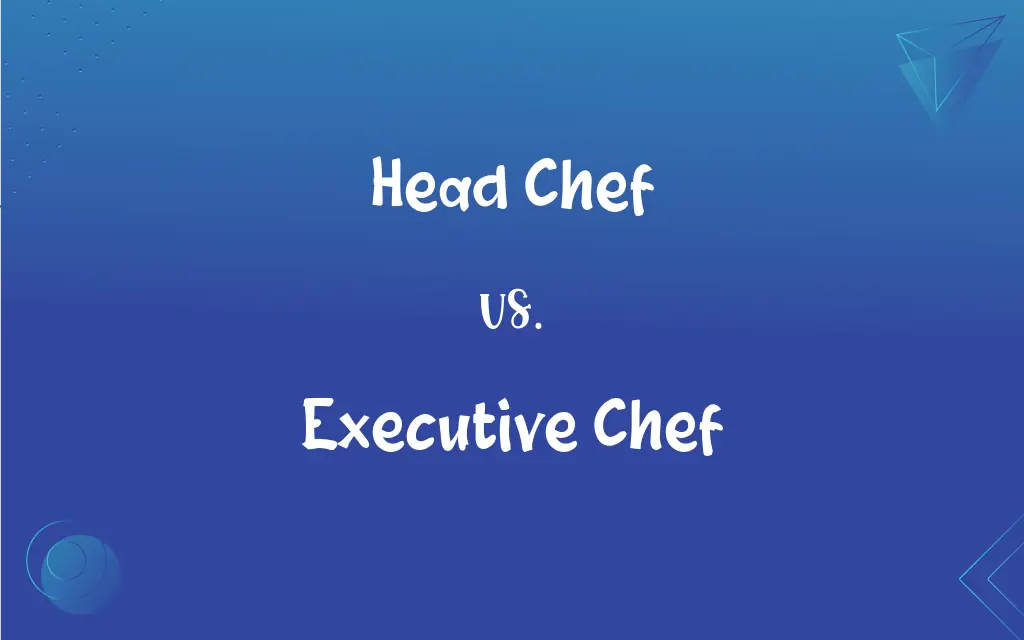Head Chef vs. Executive Chef: What's the Difference?
Edited by Harlon Moss || By Janet White || Published on November 28, 2023
Head Chef directs kitchen staff and handles daily cooking tasks. Executive Chef oversees multiple kitchens, focusing on overall culinary strategy.

Key Differences
The Head Chef is primarily responsible for the operational management of the kitchen, including direct supervision of kitchen staff and hands-on involvement in cooking. The Executive Chef, on the other hand, has a broader role that includes strategic planning, menu development, and overall management of multiple kitchens or culinary departments.
In the kitchen hierarchy, the Head Chef usually reports to the Executive Chef. The Executive Chef holds a senior managerial position and is responsible for making executive decisions regarding the kitchen, menu, and staff.
The Head Chef is deeply involved in the daily operations of the kitchen, from menu execution to staff training. In contrast, the Executive Chef may not be as involved in day-to-day operations but focuses on strategic planning, budgeting, and liaising with other departments or the restaurant management.
While both roles require culinary expertise, the Head Chef is often more hands-on in crafting and executing dishes. The Executive Chef, meanwhile, is responsible for setting the culinary vision and standards for the establishment or establishments they oversee.
The Executive Chef typically requires stronger business and management skills, dealing with budgets, cost control, and broader operational decisions. The Head Chef, while also needing management skills, is more focused on the practical aspects of running a kitchen efficiently.
ADVERTISEMENT
Comparison Chart
Main Responsibilities
Managing kitchen operations, supervising staff, cooking
Strategic planning, overseeing multiple kitchens
Hierarchy
Reports to Executive Chef
Top managerial position in culinary department
Daily Involvement
Hands-on daily kitchen management
Focuses on overall strategy, less day-to-day cooking
Culinary Focus
Directly involved in cooking and menu execution
Sets culinary vision and standards
Business Skills
Operational management of the kitchen
Broader business and financial management
ADVERTISEMENT
Head Chef and Executive Chef Definitions
Head Chef
Involved in creating and executing menus.
The Head Chef introduced new dishes for the winter season.
Executive Chef
Represents the culinary brand in public.
The Executive Chef appeared on a cooking show to promote the restaurant.
Head Chef
Oversees and trains kitchen staff.
Our Head Chef conducts regular training sessions for the cooks.
Executive Chef
Develops overall menu concepts.
The Executive Chef collaborated with local producers for menu ingredients.
Head Chef
Leads the kitchen team during service.
During dinner rush, the Head Chef coordinated the kitchen team efficiently.
Executive Chef
Handles budgeting and financial decisions.
The Executive Chef proposed a new cost-saving strategy.
Head Chef
Ensures food quality and consistency.
The Head Chef tasted every dish before service.
Executive Chef
Sets the culinary direction for the establishment.
The Executive Chef planned a complete overhaul of the menu.
Head Chef
The Head Chef manages daily kitchen operations.
The Head Chef scheduled a staff meeting to discuss menu changes.
Executive Chef
Manages operations across several kitchens.
Our Executive Chef regularly visits all the kitchens in the chain.
FAQs
What responsibilities does an Executive Chef have?
Strategic planning, menu development, and overseeing multiple kitchen operations.
Who reports to the Head Chef?
Kitchen staff like sous chefs, line cooks, and pastry chefs.
Does an Executive Chef work in one specific kitchen?
No, they usually oversee several kitchens.
Does a Head Chef cook daily?
Yes, they are typically hands-on with cooking tasks.
What is a Head Chef?
A Head Chef manages the daily operations of a single kitchen.
What is an Executive Chef?
An Executive Chef oversees the culinary strategy of multiple kitchens or an establishment.
Do Head Chefs need business skills?
Yes, but less so than Executive Chefs.
Can a Head Chef create menus?
Yes, they often have significant input in menu creation.
Is financial management part of a Head Chef's role?
To some extent, but it's more central to an Executive Chef's responsibilities.
How does an Executive Chef influence a restaurant?
Through setting culinary standards and overall kitchen management practices.
Is creativity important for a Head Chef?
Yes, especially in menu design and food presentation.
Do Executive Chefs interact with customers?
They often do, especially in high-end establishments.
How do Head Chefs handle staff issues?
They directly manage and resolve staff conflicts and performance issues.
Do Executive Chefs need marketing skills?
Yes, as they often represent the culinary brand publicly.
To whom does an Executive Chef report?
They often report to the top management or owners of the establishment.
Can a Head Chef become an Executive Chef?
Yes, with experience and additional management skills.
What is the career path to become a Head Chef?
Starting as a line cook or sous chef, gaining experience, and moving up through the ranks.
What’s the difference in salaries between the two roles?
Executive Chefs typically earn more, reflecting their broader responsibilities.
Do both roles require culinary education?
Yes, formal culinary training is beneficial for both positions.
What kind of establishments hire Executive Chefs?
Large restaurants, hotel chains, and food service companies.
About Author
Written by
Janet WhiteJanet White has been an esteemed writer and blogger for Difference Wiki. Holding a Master's degree in Science and Medical Journalism from the prestigious Boston University, she has consistently demonstrated her expertise and passion for her field. When she's not immersed in her work, Janet relishes her time exercising, delving into a good book, and cherishing moments with friends and family.
Edited by
Harlon MossHarlon is a seasoned quality moderator and accomplished content writer for Difference Wiki. An alumnus of the prestigious University of California, he earned his degree in Computer Science. Leveraging his academic background, Harlon brings a meticulous and informed perspective to his work, ensuring content accuracy and excellence.







































































